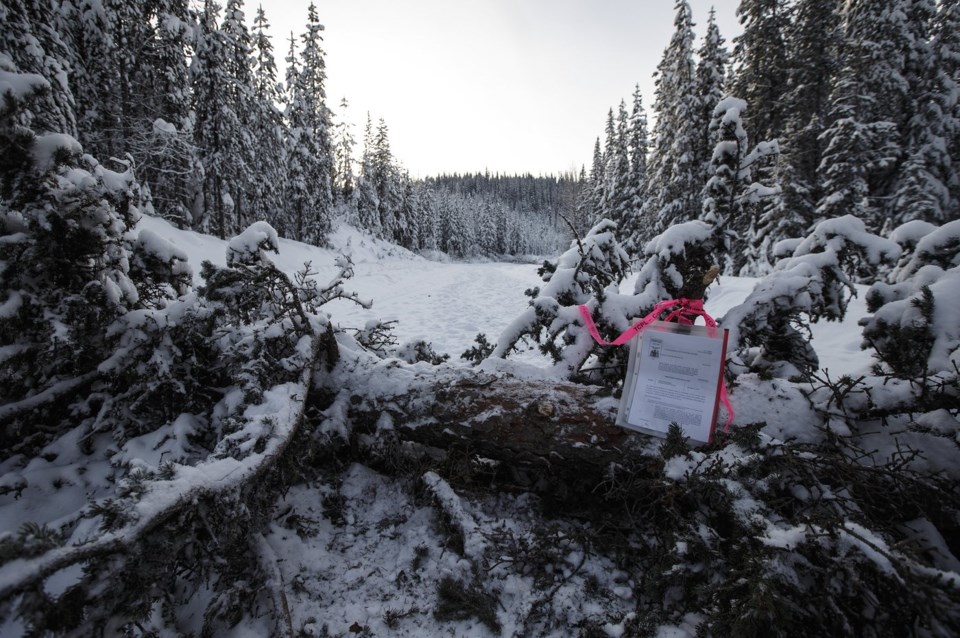A B.C. Supreme Court judge has found members of the RCMP made "grossly offensive, racist and dehumanizing" remarks about Indigenous women who were arrested in 2021 during a blockade of Coastal GasLink pipeline construction.
Justice Michael Tammen said in a ruling delivered in Smithers, B.C., on Tuesday that his findings of state misconduct don't warrant a stay of proceedings against the women, but they and another protester will get a reduction in their sentences for criminal contempt as an "appropriate" remedy.
Tammen said audio recordings captured police laughing and comparing the women protesters to "orcs," monstrous characters from "The Lord of the Rings."
He said the racist comments breached the Charter rights of Wet’suwet’en hereditary Chief Sleydo’ Molly Wickham and Shaylynn Sampson who were arrested by the RCMP on Wet’suwet’en territory near Houston, B.C.
Coastal Gas Link got an injunction to continue its pipeline construction, and police moved in on blockaders in November 2021, making numerous arrests.
Wickham, Sampson and a man who also participated in the blockade, Corey Jocko, were convicted of criminal contempt for breaking the injunction in January 2024, but they applied to have the case stayed alleging "systemic misconduct by the police during the injunction enforcement."
They claimed the misconduct was an abuse of process, and wanted the charges tossed over alleged breaches of their Charter rights due to racist comments by police, excessive force and warrantless entry of two structures used by protesters during the blockade.
Tammen said Slaydo and journalist Amber Bracken had recording devices on them that were seized by police during their arrests, but the devices kept recording after being placed in police vehicles.
The devices captured conversations between police officers that referred to Slaydo and Sampson "in highly offensive and clearly racist terms," Tammen said.
The judge said both women had red hand prints painted on their faces, "a symbol of respect and solidarity" with missing and murdered Indigenous women and girls.
He said officers were recorded comparing the women to "orcs," and laughing.
The judge agreed with the defence that the police officers' "comments were grossly offensive, racist and dehumanizing," and amounted to a breach of their Charter rights.
"Those comments undermine the integrity of the judicial process," Tammen said.
Frances Mahon, a lawyer for the three accused, said in a livestream media availability after the decision that the court's finding was "extraordinarily rare."
"Today was not a complete victory, it is still a victory," she said.
Mahon said Tammen's findings about the police needing warrants to enter structures occupied by protesters was important, but the judge's findings about the RCMP's racist comments were particularly important.
Tammen found the conduct "extremely serious," with racism being directed at Indigenous women who have been "systematically disadvantaged throughout all sectors of the criminal justice system for generations."
The Crown's suggestion of an apology, Tammen said, was not adequate to convey "judicial condemnation."
"This is an extraordinary statement for a judge to make, and one I have not seen in my career as a lawyer, put so succinctly and so powerful," Mahon said.
Sleydo’ said the RCMP unit that enforced the injunction, now known as its Critical Response Unit, acts as "unaccountable mercenaries for private industry."
She said the case was a "showdown" between Wet’suwet’en law and colonial law, and hopes Tammen's decision will "assist other land defenders in the future."
"I refuse to allow the colonial courts to dehumanize and criminalize me," she said. "I belong to my land, my ancestors and my people."
Jocko said later in the livestream that the case since his arrest has been "beyond a roller-coaster," and regardless of the findings, there's no reason not to be proud after being "prosecuted for protecting the land and protecting the water."
The judge found that there was no evidence that racist attitudes were "encouraged or condoned" by police leadership, two of whom were "genuinely shocked and disgusted by the comments made by their fellow officers."
Tammen also rejected claims that police used excessive force or employed "unnecessary resources" to dismantle the blockade.
"The police were unaware of the number of protesters they might encounter," Tammen said. "They were not engaged in a simple peaceful demonstration akin to a sit-in, but rather wanton destruction of property, including vehicles and infrastructure. Police did not know if the protesters were armed nor if they were violent."
Criminal contempt carries a maximum sentence of five years in prison, but those convicted typically receive short sentences, the judge said.
"The offending conduct here was serious. It involved the calculated, prolonged and well organized attack on a court order," he said. "The actions of the accused were a clear attack on the rule of law."
"Criminal contempt by its very nature poses a threat to the rule of law, without which there would be anarchy."
The case will be back in court on April 3 to fix a date for sentencing.
This report by The Canadian Press was first published Feb. 18, 2025.
Darryl Greer, The Canadian Press
